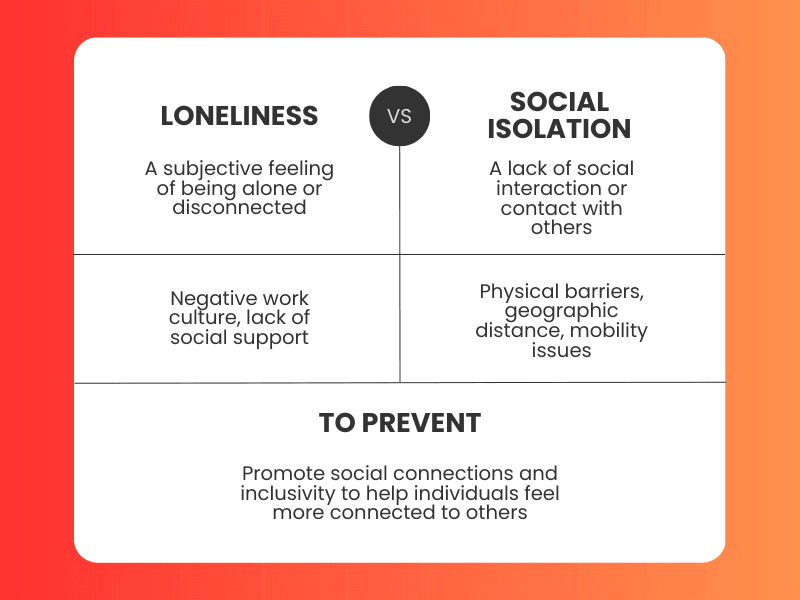Loneliness at Work: Strategies for Building a Culture of Happiness
The problem of loneliness in the workplace is becoming increasingly prevalent in today's fast-paced world. It has been observed that more than 40% of employees feel lonely at work, which can result in reduced productivity, heightened stress, and even depression. But how can organizations effectively tackle this issue? Some practical strategies should be taken to address the problem of loneliness, such as building a workplace culture that promotes social connection, positive relationships, and overall well-being. Whether you are an employee seeking to enhance your work experience or a manager aiming to create a more positive workplace culture, these tips are for you!
Differences Between Loneliness & Social Isolation

It's crucial to evaluate and understand the difference between feeling lonely and being socially isolated at work. Loneliness can be defined as a feeling of being disconnected or isolated from others. Although it is often used interchangeably with social isolation, it is important to note that the two are not the same. Loneliness is the subjective experience of feeling disconnected or separated from others, regardless of the amount of social contact one has. This means that someone can feel lonely even if they are surrounded by people, if they do not feel a sense of belonging or connection with those around them.
Social isolation, on the other hand, refers to an objective lack of social contact or connections. This can occur when someone is physically or geographically isolated, such as working remotely or living in a rural area with limited social opportunities.
It's important to recognize that both loneliness and social isolation can have negative impacts on mental health and well-being. Let’s extend our discussion to the causes of loneliness in the workplace.
Causes of Workplace Loneliness
We can list the causes of loneliness in three main items:
- Remote work
- Lack of social support
- Negative work culture (it is a dangerous one!)
With the rise of telecommuting and remote work, many employees are now working from home or other remote locations, which can lead to feelings of isolation and disconnection from their colleagues. Additionally, the lack of face-to-face interaction can make it difficult for employees to establish meaningful connections with others. But it is not that hard to provide meaningful interaction opportunities in remote work, as we will discuss in the following sections.
Lack of social support can occur when employees feel that they do not have anyone to turn to when they are struggling with work-related issues or personal problems. In some cases, employees may feel that their colleagues or superiors are not approachable or supportive, which can lead to feelings of isolation and loneliness.
Negative work culture also contributes to workplace loneliness. When employees feel that they are working in a toxic or unwelcoming environment, they may become disengaged and disconnected from their colleagues. Negative workplace culture can take many forms, including bullying, harassment, and discrimination, and can have a significant impact on employees' mental health and well-being.
These causes are the root of some serious problems in the workplace.
Dangers of Loneliness In The Workplace
While we often think of loneliness as a personal issue, it can have serious implications for employees and companies alike. Studies have shown that workplace loneliness can have negative effects on employee well-being and job satisfaction. Employees who feel lonely at work are more likely to experience stress, anxiety, and depression. They may also feel less engaged in their work, leading to decreased productivity and job satisfaction.
The negative effects of loneliness can also spill over into team dynamics and company culture. When employees feel isolated and disconnected from their colleagues, they may be less likely to collaborate and share ideas. This can lead to a lack of innovation and creativity within the team. Additionally, workplace loneliness can contribute to a toxic company culture, where employees feel unsupported and undervalued.
In order to address workplace loneliness, organizations need to take a proactive approach. This includes creating a supportive work environment that fosters social connections among employees. One way to achieve this is by promoting team-building activities and encouraging social interactions, both in and out of the workplace. In the following section, we will cover more tips for fighting workplace loneliness.
Strategies for Overcoming Workplace Loneliness

After all these concerns, causes, and dangers of workplace loneliness, it is time to provide some actions that can be easily taken to overcome.
- Taking the Initiative & Engaging in Small Talks: Don't wait for others to approach you. Start conversations with coworkers during breaks, lunchtime, or before and after meetings. Ask them about their interests or hobbies, and share your own experiences and passions. Small talk can lead to deeper connections and help relieve feelings of isolation.
- Building a Positive Work Environment: This can include expressing gratitude and appreciation for colleagues, offering support and encouragement, and practicing empathy and understanding. By creating a positive and supportive work environment, individuals can feel more valued and connected to their colleagues, reducing feelings of loneliness and isolation.
- Building a Support Network: It is important for individuals to recognize that workplace loneliness is a common experience and that they are not alone in their feelings. By reaching out to others who may be experiencing similar emotions, individuals can build a sense of community and support within the workplace. This can involve connecting with colleagues, seeking out support from a therapist or counselor, or joining a support group for individuals experiencing workplace loneliness.
- Creating Social Opportunities in the Workplace: Joining workplace committees or groups can help people to feel more connected to their colleagues and provide opportunities for collaboration and engagement. Look for ways to connect, such as grabbing lunch together, attending social events, or participating in team-building activities. If you work remotely, look for virtual social opportunities such as online chat groups or video conferences.
By taking these steps to build social connections in the workplace, you can help to overcome feelings of loneliness and build a stronger sense of community with your colleagues.
Overcoming Workplace Loneliness: A Journey Towards Happiness
Employers, managers, and HRs play an essential role in fostering a culture of inclusivity and support that addresses feelings of loneliness at work. By being aware of the signs of loneliness and promoting a culture of openness and communication, employers can create opportunities for team building and socializing while providing resources for those who are struggling.
At Guul, we prioritize employee happiness and have developed a game-based solution for businesses & communities to overcome workplace loneliness. Together, we can create a happier, more connected, and more successful workplace culture by prioritizing employee well-being and building a supportive work environment. Let's take steps towards overcoming workplace loneliness and building a culture of happiness and connection in the workplace.


